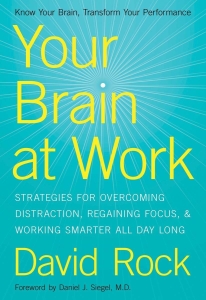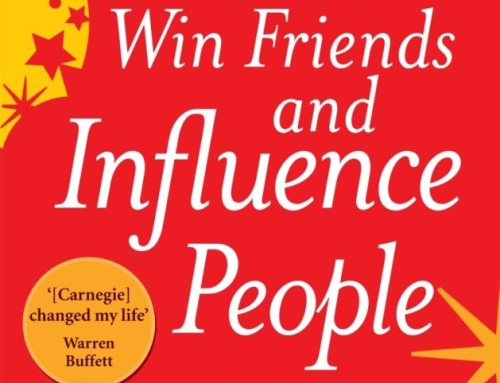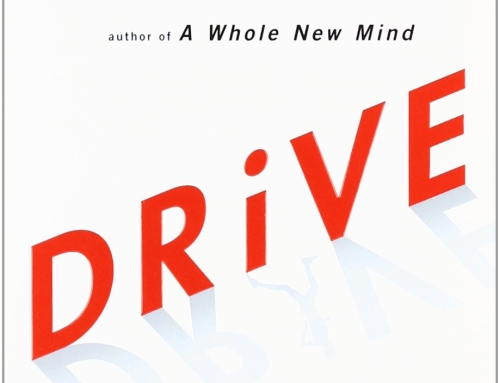Project Description
Subtitle: Strategies For Overcoming Distraction, Regaining Focus, and Working Smarter All Day Long
By: David Rock
Notes:
- Mental tasks hurt the ability do physical activity and vica-versa over the short-term.
- But exercise increases brain activity over the long-term.
- Glucose can restore brain activity. That’s why when ppl are tired or hungry, they can’t think.
- Do the most important work in the morning when I’m fresh.
- Or after a good rest of physical exercise.
- Create visuals for complex ideas.
- Get things out of your head. Saves energy. Physical objects work also.
- Break work up into segments that use different bits of the brain.
- Plan to do deep thinking at the same time.
- Delegate well: Best to get rid of remedial tasks.
- Brain’s memory works like ram. Turn off all non-essential tasks and focus on one.
- When pitching things, use what people already know. Simplest is best.
- When pitching the movie alien, they said it was Jaws in space.
- Brain organizes things in to clunks of information. Each chuck is the same of the words that are easy to say. Seventy two, versus, seven thousand, two hundred…
- Write a time limit to stay focused on the project at hand.
- New concepts are less intensive than old ones.
- Prioritize intensive tasks before other tasks.
- Hold meetings earlier in the day versus when ppl are tired.
- Break large amounts of information down into chunks.
- Doing two intensive tasks at once took twice as long, thus no time savings.
- If accuracy is important, don’t divide your attention.
- Constant emailing and texting reduces IQ points by 10 points, because ppl are on constant alert.
- It’s like always watching out for a tiger in the wild.
- The more email’s, etc. that you respond to, the more hat will get sent.
- Eliminate constant interruptions and you’ll focus better.
- For long term memory to form, must focus on that activity.
- Once an activity is embedded (like driving), one can learn subtle other things.
- Bottleneck is a series of unfinished connections. Must make a list of thoughts and find the first necessary one to address.
- Thinking of the right order to make decisions saves time and energy to focus on other tasks.
- Mix up your attention from full attention to split attention.
- If you have to multi-task, embed repetitive tasks with deep-thinking tasks.
- Office distractions eat up 2.1 hours a day.
- Bigger computer screen is one of the best ways to increase productivity.
- Simple technique is to switch off all electronic devices when focused on one thing.
- Stopping internal distractions is energy intensive and requires will-power to stay focused.
- To train yourself, stop letting distractions take over your senses early in the process.
- Stress means to emphasize:
- Positive stress helps focus attention.
- A moderate amount of stress leads to good performance.
- Too much stress reduces performance.
- To get more adrenaline, imagine a fearful situation. Boxer goes into a ring and dies.
- Key is to rouse the brain, but not obsess about the fear.
- Positive feelings (imaging rewards, etc.) produces more beneficial stimulus than fearful or negative feelings about something.
- When you need to produce good work, think about the positive outcomes.
- Men wait till the last min so they have the chemicals motivate themselves.
- “Flow” is one of the four keys to happiness.
- An insight is one that connects different parts of the brain.
- Might have to go unconscious in order to have an insight.
- To have an insightful idea, must stop thinking in the current path.
- To get around an impasses, think of trying to change the direction of traffic on a bridge. Stop it first, but then do again.
- Anxiety decreases insight. Happiness increases insight.
- That’s why google mixes fun and play with work.
- To get past an impasses, do something totally different and then go back to it.
- Match ppl with lots of detail with someone who doesn’t have much detail. Will lead to better ideas.
- Insights happen when people can change their brain.
- Steps to increase insight:
- Be aware of the problem, but don’t get crazy about it.
- Simplify idea: fewer words are better. Versus getting too detailed.
- Relax with the idea. (get everyone off the stage). Focus on the idea.
- Helpful to take a deep breadth when distracted
- Practice activating your fun attention on everything that’s directly in front of you. Practice makes perfect.
- Humans walk towards positive situations, but run away from negative ones…. Naturally.
- Arousal of the limbic causes mistakes. There are ways to silence this arousal to focus better.
- Suppression of emotions makes others feel uncomfortable and hurts the subject person.
- Speak about an emotion in one or two words and it’ll reduce the emotion. Have a dialog about the emotion and it’ll get worse. Recognize the emotion and stay calm.
- Women tend to be better at labeling their emotions.
- A sense of autonomy is helpful to dealing with stress.
- Uncontrollable stressor cause the most destruction.
- Low level employees die sooner than executives because they don’t have choice.
- Work / life balance is a main reason to start one’s own business even though they work longer.
- Terrible teen behavior is unique to western society. It is assumed that they have fewer choices and they causes their problems. Give teens more say and they’ll behave.
- Key to reappraisal is to find the positive in every situation.
- Take another person’s perspective can help reappraise the situation.
- Without any arousal, other thoughts wonder in to your brain
- Ppl are better off when they reappraise. Ppl who see life through rosy glasses are happier and do better work.
- Optimist have an embedded positive reappraisal technique.
- Humor helps to make a crowd reappraise quickly and easily.
- A goal automatically orients the person in the right way.
- Unmet expectations can lead to negative effects on people. Managing expectations is key.
- Exceeded expectations stimulate a great response of dopamine.
- Brain is best at connecting in person (mirror nuance).
- The one thing that makes people happy is the quality and quantity of social connections.
- Learning increases when you speak to someone about an idea, because it creates more connections in the brain.
- Think someone is a foe makes you less smart when dealing with them.
- When in a group of ppl that don’t know each other, make sure to spend a few minutes breaking the ice.
- Companies that encourage water cooler talks leads to greater productivity.
- Employees want fairness. More productive.
- Give employees time to volunteer helps to increase fairness.
- Status is a big driver of behavior. Ppl don’t like to be excluded.
- High status people tend to live longer and achieve bigger rewards, smarter…
- “The Status Syndrome”
- Saying good job often to kids generates great responses.
- Key to status is to find a niche where you feel you are superior.
- When people fit for status, they fight over status versus work together.
- Pointing out what people do well helps to increase their status especially when done publicly.
- Successful people play against themselves by challenging themselves. Give status boost.
- Timeouts work on kids, because their lose status.
- Great leaders are often humble leaders.
- Let others take charge, speak about the future, keep their promises,
- Bad leaders micromanage, unclear goals.
- Better to focus on the solution than to focus on the problem. Can’t do both.
- When you ask ppl to focus on their own ideas, this initiates their thinking.
- Making it subtle is best.
- Ppl are easily threatened by feedback, so it’s best to ask them questions to get themself to produce the feedback.
- Best to write and leave some time between when you edit the paper.
- Best way to help someone see something new is to help quite their mind so they can have an insight.
- Reward ppl for activating their direction.
- Learning a language is easier in a foreign country, because you have to eliminate your current language to rewrite the brain.
- Use “would you be willing to do this?” instead of do this.
- A good story is important for memory and getting a point through.
- Setting the right goal is fantastic.
- Writing a task down increases the intensity of the brain which helps.
- The brain is social, so collaboration is key.
- Ideas come alive in conversation.
- Leaders how are overly intelligent tend not discount their weaknesses and those in others.





Leave A Comment